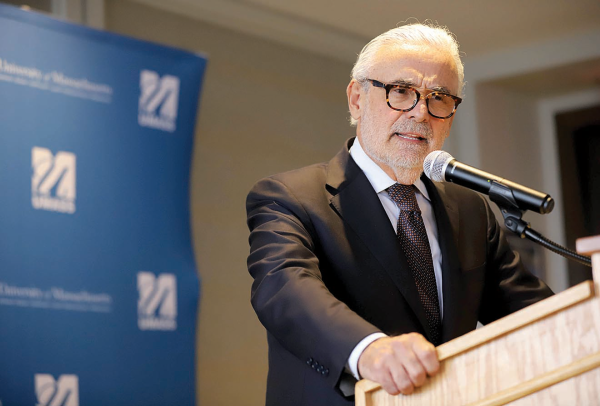September 25, 2024

UMass Boston Chancellor Marcelo Suárez-Orozco. Photo courtesy UMass Boston
UMass Boston and Bunker Hill Community College will launch a “new pathway” for students to transition to four-year college through a partnership agreement that will ease transfers and encourage collaboration between the two Boston campuses. The agreement, announced on Sept. 25, is dubbed the “Future Beacon Joint Admissions Program.”
UMass Boston Chancellor Marcelo Suárez-Orozco says it will open “a welcoming, supportive pathway for them to continue their educational journeys, find what they love, and shape meaningful careers.”
Bunker Hill sends more transfer students to UMass Boston than any other institution, with roughly 300 students making the switch each year, according to UMass Boston, which added that it “welcomes more than 1,500 new transfer students annually, more than any other public university in Massachusetts.”
Said BHCC President Pam Eddinger, “We both understand what it means to serve our urban and gateway communities of first-generation college students, of immigrant families, and post-traditional learners. This joint admissions agreement not only brings our institutions closer together and more focused than ever on that critical work, but it also means our students will have a seamless opportunity to go from community college to bachelor’s degree and beyond.”
The agreement will allow prospective students to simultaneously apply to both BHCC and UMass Boston. Bunker Hill students will also be able to “access campus resources, including a UMass Boston Student ID, Wi-Fi, various athletic and student life events, Beacon Fitness Center, and Healey Library resources. Upon graduation, they are guaranteed admission to UMass Boston with a 2.0 GPA or better (excluding competitive programs).”
The program also includes fee waivers for enrollment deposits and merit scholarships – up to $2,000 per year – to eligible students.
News of the agreement comes as the overall five-campus UMass system has seen a dip in enrollment. During a UMass Board of Trustees Administration and Finance Committee meeting last week, university officials said enrollment is up this year by a scant 0.1 percent across its campuses and acknowledged a big gap in funding for needed infrastructure repairs and upgrades. Over the past 20 years, the average annual enrollment growth rate at UMass has steadily declined.
UMass President Marty Meehan said the demand for a UMass education “remains strong” while also noting the significant demographic challenges facing universities across the nation as the population of high school graduates continues to decline, “especially in the Northeast.”
“We’ve seen it not only with the non-elite privates, we’ve also seen it with the community colleges – enrollment is down significant over the last decade, as well as the state universities. At UMass, we’ve done much better, but like every university we’re looking at these challenges, and if those challenges are left unmanaged, they’d have the potential to challenge our university as well.”
Enrollment figures presented at the meeting showed 30,460 full-time students at UMass Amherst. Enrollment at UMass Boston has risen since fiscal 2022 and stands at 13,085, while enrollment at UMass Lowell has declined over the same period to 13,521. UMass Dartmouth has 6,604 students enrolled this fiscal year, and there are 1,425 students enrolled at the UMass Chan Medical School in Worcester.
At a UMass Committee on Academic and Student Affairs meeting, also last Wednesday, Meehan gave a presentation on enrollment that mainly touched on the diversity of the incoming class of 2028.
“Despite the United States Supreme Court decision last year overturning affirmative action in college admissions,” he said, “UMass continues to educate a student body that is increasingly reflecting the diversity of our commonwealth. In fact, the class of 2028 is the most diverse in our university’s history.”
Exactly half of the incoming class at UMass are students of color, up from 48 percent in fall 2023. At UMass Boston, the most diverse of the system’s campuses, 73 percent of class of 2028 members are students of color.
A State House News Service report contributed to this story.


